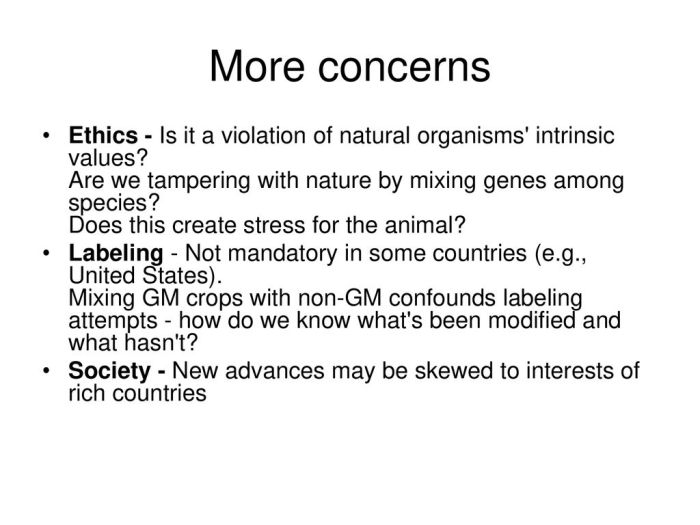As scientific advancements in genetic engineering accelerate, the ethical implications of manipulating the genetic code of living organisms come to the forefront. Are we tampering with nature in an unethical way? This question raises concerns about the potential consequences of unintended or unforeseen outcomes of genetic modifications and the impact on biodiversity and ecosystems.
On the other hand, genetic engineering holds immense promise for advancements in medicine, agriculture, and other fields. Striking a balance between innovation and precaution is crucial, as is ensuring the ethical use of genetic technologies through robust regulatory frameworks.
Scientific Advancements and Ethical Considerations

Rapid advancements in genetic engineering have unlocked unprecedented potential to modify the genetic code of living organisms. This raises ethical concerns about the consequences of manipulating nature in such a profound way. Unforeseen outcomes and the potential impact on biodiversity and ecosystems must be carefully considered before widespread use of genetic modifications.
Ethical Concerns of Genetic Engineering, Are we tampering with nature in an unethical way
- Altering the genetic makeup of organisms could have unintended and potentially harmful consequences for the individual, the species, and the ecosystem.
- The long-term effects of genetic modifications are often unknown, raising concerns about potential risks that may not be immediately apparent.
- Genetic engineering could lead to a reduction in genetic diversity, which is essential for the resilience and adaptability of species.
Balancing Innovation and Precaution

Despite the ethical concerns, genetic engineering offers promising applications in medicine, agriculture, and other fields. However, it is crucial to strike a balance between innovation and precaution.
Importance of Regulation
- Regulatory frameworks are necessary to ensure the ethical and responsible use of genetic technologies.
- Regulations should be based on sound scientific evidence and should be regularly reviewed and updated to keep pace with advancements in the field.
- International cooperation and harmonization of regulations are essential to prevent discrepancies and ensure the safe and ethical use of genetic engineering worldwide.
Impact on Biodiversity and Ecosystems

Genetic engineering has the potential to impact biodiversity and ecosystems in both positive and negative ways.
Risks to Biodiversity
- Genetically modified organisms (GMOs) could outcompete natural species, leading to a decline in biodiversity.
- GMOs could transfer their modified genes to wild populations, potentially altering the genetic makeup of natural ecosystems.
- Genetic engineering could lead to the creation of new organisms that may have unforeseen ecological consequences.
Societal Perspectives and Values

Public opinion on genetic engineering is shaped by a complex interplay of scientific, ethical, and cultural factors.
Importance of Public Engagement
- Public engagement and education are essential for fostering informed decision-making about genetic technologies.
- Open and transparent discussions about the potential benefits and risks of genetic engineering are crucial for building trust and public acceptance.
- Cultural and religious values should be taken into consideration when assessing the ethical implications of genetic engineering.
Governance and Decision-Making
Effective governance is essential to ensure the ethical and responsible use of genetic engineering.
Stakeholder Involvement
- Stakeholders, including scientists, policymakers, industry representatives, and the public, should be involved in decision-making processes related to genetic engineering.
- Transparent and inclusive processes are crucial for ensuring that all perspectives are considered.
- Ethical guidelines and regulations should be developed with input from a diverse range of stakeholders.
FAQs: Are We Tampering With Nature In An Unethical Way
What are the main ethical concerns about genetic engineering?
Ethical concerns include the potential for unintended or unforeseen consequences of genetic modifications, the impact on biodiversity and ecosystems, and the equitable distribution of benefits and risks.
How can we ensure the ethical use of genetic engineering?
Robust regulatory frameworks, public engagement, and transparent decision-making processes are essential to ensure the ethical use of genetic technologies.
What are the potential benefits of genetic engineering?
Genetic engineering holds promise for advancements in medicine, agriculture, and other fields, such as developing cures for genetic diseases, increasing crop yields, and creating sustainable biofuels.